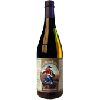Brasserie Theillier - La Bavaisienne
-
ABV:
7.00% -
Serving Temperature:
45-50° F -
Suggested Glassware:
Tulip or Oversized Wine Glass
Bière de Garde, which means “beer for keeping,” or “beer which has been kept,” developed within artisanal farmhouses as the only style of beer indigenous to France. The beer would be brewed in early spring, then aged in earthen cold cellars for consumption in the later, hotter months. It therefore had to be a somewhat substantial beer, in order to “keep” during that period, but needed to balance this character with a refreshing nature as workers would quench their thirsts in the summer heat. It is similar to Belgium’s equivalent farmhouse style known as Saison, but tends to be rounder and more malt focused, with a bit more cellar character than farmhouse notes. Pour this beer somewhat gently to avoid stirring up the sediment at the bottom of the bottle. Expect a medium amber beer with a thick, sticky, beige head. While beers in the Bière de Garde style are traditionally malt focused, this beer offers a beautiful bouquet of both malt and hop scents. Look for candied citrus notes (think papaya and oranges, with some apple skins), fresh dough, flower, and prickly spices coming from the hops and the yeast, all wrapped in a clean, cereal grain background. There’s a “fresh mustiness” to it if there is such a thing—a paradoxically “clean” cellar character. The alcohol heats the nostrils just a bit, amidst prominent orange and caramel notes, with a toasted edge. The hops are used mainly for aroma, as the beer is predominantly malty on the palate. What initially strikes as ‘edgy’ on the nose (hoppy, spicy notes) actually comes through very clean and refined in the flavor. The beer opens with notes of bready, doughy, toasty, caramel malts drizzled with honey. Traditional beers like this really help one understand the common expression of beer as “liquid bread,” because this is as accurate a description as any for this brew. Look for notes of tart berries and a woody spiciness, and as it warms, alcohol emerges mid-finish. As expected for the style, there is less “funkiness” or farmhouse-like (often referred to as ‘horse blanket’) notes; instead, a mild cellar quality is present (as mentioned above, this is one of the hallmark differences between Bière de Garde and Saison). La Bavaisienne ends with a bit of acidity, giving a tartness that dries things up and has the palate begging for another sip, as a mild bitterness works in tandem with the tartness to execute its superb dryness. A case study in Bière de Garde—we suggest trying this alongside a traditional Belgian Saison to compare the differences in these related yet independent styles of beer.
Atop ancient remains of Roman cellars and walls sits the Theillier family home, built in 1670, within which is their very tiny but bigly revered artisanal brewery. The late, legendary beer writer Michael Jackson himself noted that “this remarkable brewery deserves to be better known.” But the brewery is already celebrated enough in their immediate region to keep the 5th generation Theillier brewer, Michel, very busy; he not only brews the beer himself, using a combination of ancient and more modern equipment, but also hand-delivers it in and just outside of town. Which is why you basically can’t get this beer outside of a 20 mile radius of the Theillier home; and it’s been that way since they started selling their beer in 1832.
As you can imagine, this one man show doesn’t do much advertising, as the beer sells itself. But it doesn’t make itself, meaning little time is left to maintain a fancy website (or any website for that matter). If you want more info, consider stopping by the brewery—it’s just across from the France-Belgium border, so you can’t go wrong with a trip to the region. They’re located at 11 Rue de Chausee, in Bavay, France (about 50 miles southeast of Lille).

Unmatched Variety by style, brewery & country
Choose from Five different Beer Clubs offering unmatched variety by brewery,
country of origin, and beer style to suit your specific tastes.


